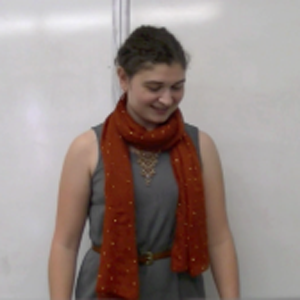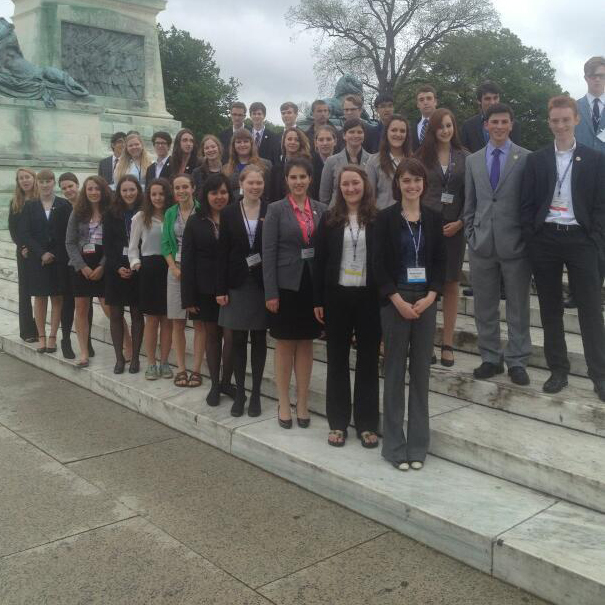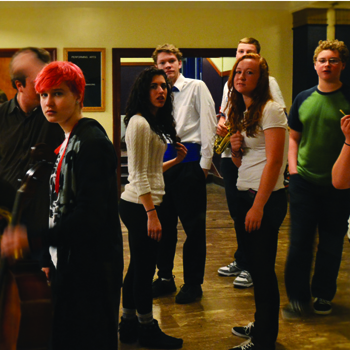Three pairs of feet jerk and slide across the Grant High School cafeteria floor as upbeat hip-hop music plays from an iHome turned up to full blast.
One of the dancers holds a half-eaten burrito in his hand as he does The Dougie in the middle of the room. Another holds an entire plate of taco salad.
Some students stare at the performance from their tables. Others ignore it. Slowly, a small group congregates and watches intently, absorbing every turn, twist and ankle flick.
This happens at least once a week, according to 16-year-old sophomore Nick Chrisman, a regular cafeteria dancer. Along with freshmen D’shawn Lampkin and Justin Robinson, both 15, Chrisman performed in Grant’s talent show last month. They were the three silhouettes dancing on the dimly lit stage, and they also performed in Spanish teacher Mario O’Brien’s act.
The week before the show, the trio worked feverishly to perfect their routine. “We tried to get in practice any free period we had,” says Chrisman. “We even skipped a couple classes.”
The group was excited about the reception of their performance, but disappointed because they didn’t win. “When I was up there, I felt like we were the best,” says Robinson. But it needed a little work according to the judges.
Robinson has been dancing since childhood because there was always music playing in his house. His godmother, Angel Bagley, 35, has lived with the family since Robinson was in fourth grade. An avid gospel musician, she brought a heavy vibration to the house.
Robinson’s garage became a fully functional music studio and he would often hang out there with Bagley. That got him really interested in music. Whether it was gospel, R&B or rap, Robinson began using his voice to express himself. Dance followed suit.
In fourth grade, Robinson met Lampkin at Irvington School, where they both attended. Two years later, then-vice principal Lisa McCall noticed them as they worked on their dancing skills. “They’re both talented,” she says. “It was just very impressive to see them grow.” She scheduled a performance at the Irvington School talent show and let it go from there.
“Me and Justin together did a performance, and everybody liked it,” remembers Lampkin. Soon, the two were small-time stars. They danced at three more events over the next year, including eighth-grade graduation.
This year, the two freshmen were pointed toward America’s Got Talent, a reality TV series that features performers of all types, including dancers. The winner of each year’s show, decided by viewers, takes home $1 million. When McCall heard the show was looking for younger talent, she once again thought of the boys.
 The two friends, however, weren’t ready. Their routine was rusty because they hadn’t performed for months. When America’s Got Talent came to Portland in February, Robinson tried out with someone else instead. He and Chris Carol, a sophomore at Madison, had been dancing together more recently. They decided to give it a shot.
The two friends, however, weren’t ready. Their routine was rusty because they hadn’t performed for months. When America’s Got Talent came to Portland in February, Robinson tried out with someone else instead. He and Chris Carol, a sophomore at Madison, had been dancing together more recently. They decided to give it a shot.
The judges told the two they needed to work on their acting — a mandatory part of every audition — but that their dancing skills were phenomenal.
Robinson didn’t know how to react when he got the confirmation call. “Normally, other people would be jumping up and down in excitement,” he says. “I was just sitting there staring with my mouth open.” His mother’s response was more energetic, but the feeling was short lived.
Robinson’s stomach sank when he found out about the $5,000 it would take to get to Orlando and back twice — once this summer and again in December for follow-up auditions. It’s the next step the two must take if they want to compete in the national talent show.
There are only two college graduates in Robinson’s family. His mother went back to school at age 30 and graduated with a business degree in 2011. His dad isn’t even in the picture. The only time Robinson had substantial contact with his father was when he coincidentally played football for a league where his dad was coaching.
Money is tight in the household, but Robinson is determined to follow through with his plan to be a professional dancer. “We’re not gonna let that $5,000 stop us,” he says. “We’re gonna get the $5,000. We’re gonna get on TV. We’re gonna make it and we’re gonna be big.”
Lampkin, even though he isn’t participating this year, hopes for a similar future. “I could see myself doing dance battles with celebrities and stuff like that,” he says, “if I practice more.”
And practicing he is. One of his current outlets is the upcoming Grant theater production of “The Wiz,” a modern version of “The Wizard of Oz.” His character is an overly energetic winged monkey that works for Evillene, the witch.
In one scene, Lampkin and Robinson dance in the middle of the stage, freestyling. “I like that part best,” says Lampkin, “the funky monkey scene.”
Chrisman keeps his dance vibe going by practicing on Tuesdays and Thursdays at Groove Nation Dance Academy in Vancouver, Wash. He didn’t start dancing until eighth grade. When a childhood friend showed him some moves, he was hooked. “I was definitely not a dance person until he showed me,” he says.
Chrisman’s mother, Shinobu, has noticed her son’s new energy. “Around the house, he doesn’t walk,” she says. “He dances.”
Gabriela Portuguez is an instructor at Groove Nation and works with Chrisman every week. “He came into the picture just like anyone: unsure,” she says. “But since I’ve kind of engaged him more, he has created a world for himself in dance.”
Portuguez recognizes Chrisman’s ability and has allowed him to teach lessons of his own every once in a while. She has also hooked him up with one of the biggest dance recital shows in Vancouver.
In May, Chrisman wants to perform at the Street Supremacy hip hop dance competition at Skyview High School. He isn’t sure how he would hold up because most of the participants are serious dancers. “When it comes to battles, you never really know,” says Chrisman.
As for the future, he says: “I’ll probably be in some studio teaching.” For now, Grant’s cafeteria is the dance hall and iHome speakers the sound system. Chrisman brings them in once or twice a week and sets up shop right in the middle of the hundred or so dining students.
 After scarfing down food, Chrisman, Lampkin and Robinson freestyle dance until the bell. They occasionally have haters try to shut down the show, but for most, it has become a regular and accepted part of the cafeteria landscape.
After scarfing down food, Chrisman, Lampkin and Robinson freestyle dance until the bell. They occasionally have haters try to shut down the show, but for most, it has become a regular and accepted part of the cafeteria landscape.
Why do they do it? “This might sound real corny,” says Chrisman, with head nods of acknowledgement coming from the other two, “but when I dance I’m in my own little world. It’s just me and the music.”




































